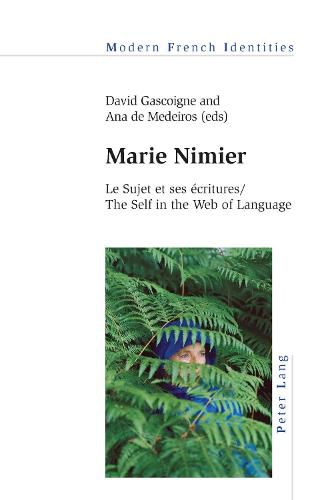Readings Newsletter
Become a Readings Member to make your shopping experience even easier.
Sign in or sign up for free!
You’re not far away from qualifying for FREE standard shipping within Australia
You’ve qualified for FREE standard shipping within Australia
The cart is loading…






This title is printed to order. This book may have been self-published. If so, we cannot guarantee the quality of the content. In the main most books will have gone through the editing process however some may not. We therefore suggest that you be aware of this before ordering this book. If in doubt check either the author or publisher’s details as we are unable to accept any returns unless they are faulty. Please contact us if you have any questions.
The collection of well-written essays offers creative and compelling readings of Nimier’s work that can serve to introduce readers to the author’s contributions to the field of autofiction, gender, and memory, to name only a few themes, or prompt new areas of inquiry for established researchers of her work. What is more, the inclusion of creative works not only allows readers to discover Nimier’s newest texts, but also reflects the creative energies of an author whose writing project includes song, theatre, and dance. (Lisa Connell, H-France Review 22.41, March 2022)
This volume constitutes a landmark in the study of one of France’s foremost contemporary writers. The diversity and originality of its critical approaches and the scholarship and creativity in evidence on every page make it essential reading for anybody interested in Marie Nimier, or in ‘self and subject’ in contemporary writing. (Professor Shirley Jordan, Newcastle University)
This diverse collection casts much-needed light on Marie Nimier’s corpus and does full justice to the complexity and richness of Nimier’s writing. It excavates with skill and sensitivity the multiple palimpsestic layers of the narrative self - whether historical, familial, sensorial or linguistic - and illuminates the relational resonances Nimier’s texts provoke, both readerly and literary. (Professor Siobhan McIlvanney, King’s College London)
In the postwar literary culture of France, under the influence of Structuralism and its aftermath, deference to the text in itself meant that literary studies eschewed discussing narrators or characters as subjects and deriving social or political commentary from specific texts. In reaction to this trend, which also influenced the writing of novels, a new generation of authors have sought instead to focus on developing innovative ways of conceptualizing subjecthood, identity and agency.
Marie Nimier’s writing abundantly exemplifies this return of the subject in the rich diversity of the fifteen novels she has published since Sirene in 1985, blending fiction and life-writing. Her narrators/protagonists typically strive to achieve forms of agency which are made possible, yet also threatened, by the ostensible givens : heritage, memory, gender, relationships, desire, social environment and, not least, language itself. This volume explores central aspects of self and subject in her oeuvre to date and includes two short stories which Nimier formally publishes here for the first time, one with an English translation.
$9.00 standard shipping within Australia
FREE standard shipping within Australia for orders over $100.00
Express & International shipping calculated at checkout
This title is printed to order. This book may have been self-published. If so, we cannot guarantee the quality of the content. In the main most books will have gone through the editing process however some may not. We therefore suggest that you be aware of this before ordering this book. If in doubt check either the author or publisher’s details as we are unable to accept any returns unless they are faulty. Please contact us if you have any questions.
The collection of well-written essays offers creative and compelling readings of Nimier’s work that can serve to introduce readers to the author’s contributions to the field of autofiction, gender, and memory, to name only a few themes, or prompt new areas of inquiry for established researchers of her work. What is more, the inclusion of creative works not only allows readers to discover Nimier’s newest texts, but also reflects the creative energies of an author whose writing project includes song, theatre, and dance. (Lisa Connell, H-France Review 22.41, March 2022)
This volume constitutes a landmark in the study of one of France’s foremost contemporary writers. The diversity and originality of its critical approaches and the scholarship and creativity in evidence on every page make it essential reading for anybody interested in Marie Nimier, or in ‘self and subject’ in contemporary writing. (Professor Shirley Jordan, Newcastle University)
This diverse collection casts much-needed light on Marie Nimier’s corpus and does full justice to the complexity and richness of Nimier’s writing. It excavates with skill and sensitivity the multiple palimpsestic layers of the narrative self - whether historical, familial, sensorial or linguistic - and illuminates the relational resonances Nimier’s texts provoke, both readerly and literary. (Professor Siobhan McIlvanney, King’s College London)
In the postwar literary culture of France, under the influence of Structuralism and its aftermath, deference to the text in itself meant that literary studies eschewed discussing narrators or characters as subjects and deriving social or political commentary from specific texts. In reaction to this trend, which also influenced the writing of novels, a new generation of authors have sought instead to focus on developing innovative ways of conceptualizing subjecthood, identity and agency.
Marie Nimier’s writing abundantly exemplifies this return of the subject in the rich diversity of the fifteen novels she has published since Sirene in 1985, blending fiction and life-writing. Her narrators/protagonists typically strive to achieve forms of agency which are made possible, yet also threatened, by the ostensible givens : heritage, memory, gender, relationships, desire, social environment and, not least, language itself. This volume explores central aspects of self and subject in her oeuvre to date and includes two short stories which Nimier formally publishes here for the first time, one with an English translation.